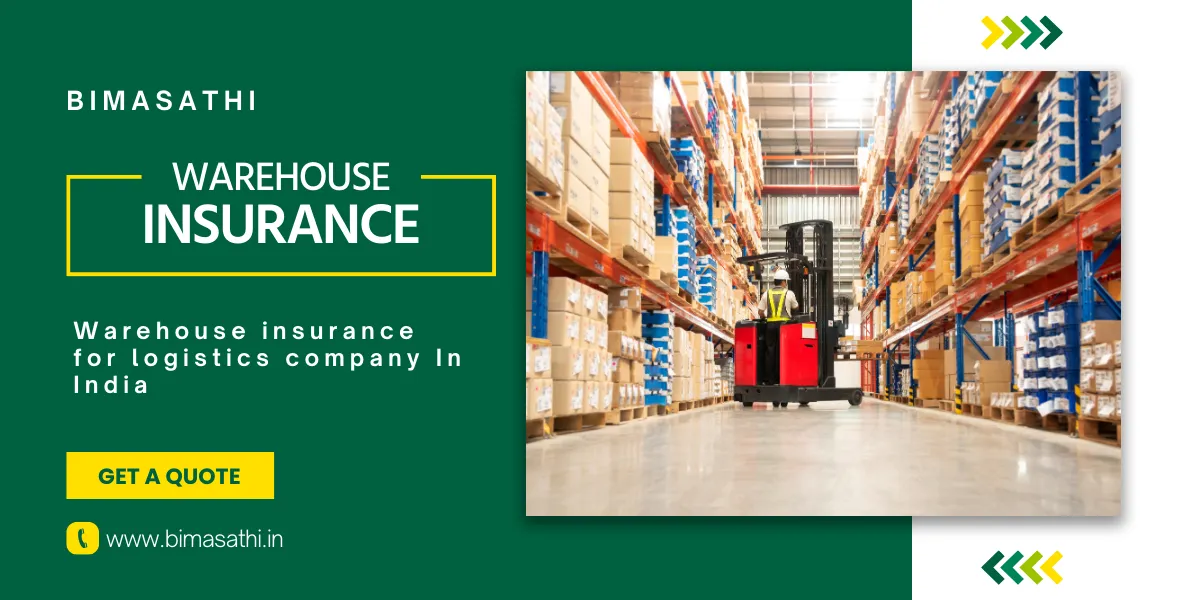Warehouse insurance for logistics company In India
By Bimasathi • 1/3/2024

Warehouse Insurance for Logistics Company | A Comprehensive Guide to Warehousing Wisdom
In the intricate dance of global logistics, warehouses serve as pivotal hubs where goods are stored, sorted, and shipped. Given the critical role these facilities play in the supply chain, safeguarding warehouses against various risks is imperative. Warehouse insurance for logistics company is a multifaceted solution designed to mitigate financial losses arising from unforeseen events. This comprehensive guide explores the importance, coverage options, and considerations surrounding warehouse insurance, shedding light on its role in risk management, business continuity, and overall operational resilience.

Understanding Warehouse insurance for logistics company
Warehouse insurance for logistics company is a specialized form of coverage crafted to protect logistics companies and their warehouses against a spectrum of risks. These risks can range from property damage to goods in storage, theft, natural disasters, and liability issues. Warehouse insurance encompasses various types of coverage, each addressing specific aspects of risk exposure associated with the operation and management of warehouse facilities.
Coverage Options for Logistics Companies
- Property Insurance:
- Building Coverage: Protects the physical structure of the warehouse, including walls, roof, and other structural components, against perils such as fire, storms, and vandalism.
- Business Personal Property Coverage: Safeguards the contents of the warehouse, including inventory, equipment, and fixtures, in the event of damage or loss.
- Business Interruption Insurance:
- Coverage for Lost Income: Protects against financial losses incurred during a temporary shutdown or disruption of warehouse operations due to a covered event, helping the business maintain financial stability during recovery.
Mitigating Property Risks, Warehouse insurance for logistics company
- Fire Prevention and Protection:
- Implementing fire prevention measures such as sprinkler systems, fire alarms, and regular inspections.
- Ensuring that stored goods are properly classified and stored according to safety regulations.
- Security Measures:
- Employing security personnel, surveillance systems, and access control measures to deter theft and unauthorized access.
- Conducting background checks on warehouse employees to mitigate internal security risks.
- Natural Disaster Preparedness:
- Assessing the warehouse's geographical location and implementing measures to mitigate risks associated with natural disasters such as floods, earthquakes, and hurricanes.
- Developing and regularly testing emergency response plans to ensure swift and effective action in the event of a disaster.
Understanding Business Interruption Coverage
- Identification of Essential Operations:
- Identifying critical functions within the warehouse operations and tailoring Warehouse insurance for logistics company by establishing contingency plans to minimize disruption in the event of a covered loss.
- Collaborating with key suppliers and logistics partners to ensure a coordinated response in the face of business interruption.
- Review of Policy Limits and Exclusions:
- Conducting a thorough review of business interruption insurance policy limits and exclusions to ensure that coverage aligns with the potential financial impact of a disruption.
- Consider extended coverage options to account for longer recovery periods.
- Documentation of Losses:
- Maintaining meticulous records of income losses, extra expenses incurred during the interruption, and other relevant documentation to facilitate the claims process.
Liability and Employee-related Considerations
- Safety Training and Protocols:
- Implementing comprehensive safety training programs for warehouse staff to reduce the risk of workplace accidents and injuries.
- Regularly reviewing and updating safety protocols to align with industry best practices and regulatory requirements.
- Liability Risk Assessment:
- Conducting regular risk assessments to identify potential liability exposures within the warehouse, such as slip-and-fall hazards, faulty equipment, or inadequate signage.
- Investing in proper signage and safety measures to reduce the likelihood of accidents and liability claims.
- Employee Well-being:
- Prioritizing employee well-being through wellness programs, ergonomic assessments, and proactive health and safety measures.
- Promoting a culture of safety and accountability among warehouse staff to reduce the risk of workplace incidents.
Customizing Warehouse insurance for logistics company
- Risk Assessment:
- Collaborating with insurance professionals or brokers specializing in logistics to conduct a thorough risk assessment, taking into account the specific operations, geographical locations, and types of goods stored in the warehouse.
- Custom Coverage Limits:
- Tailoring coverage limits based on the value of stored goods, replacement costs of the warehouse structure, and potential income losses during business interruption.
- Ensuring that coverage aligns with the scale and complexity of the logistics company's operations.
- Industry-specific Endorsements:
- Exploring industry-specific endorsements or add-ons that address unique risks faced by logistics companies, such as coverage for temperature-sensitive goods, hazardous materials, or high-value cargo.
Warehouse insurance for logistics companies is an essential component of risk management, ensuring the resilience and continuity of operations in the face of unforeseen events. By addressing property risks, mitigating business interruption challenges, managing liability exposures, and proactively tackling cybersecurity threats, logistics companies can safeguard their assets, reputation, and overall business sustainability. Customizing warehouse insurance policies to align with the unique risks of the logistics industry is not just a financial necessity but a strategic imperative for companies seeking to thrive in the complex and ever-evolving landscape of global supply chain management.
Group Personal Accident Insurance for Drivers In India
In the dynamic world of logistics, where drivers are the backbone of supply chain operations, ensuring their safety and well-being is of paramount importance. Group Personal Accident (GPA) insurance tailored for drivers in logistics companies emerges as a crucial tool to provide financial protection in the face of accidents and unforeseen events.
Have a specific question or inquiry regarding Warehouse insurance for logistics company In India? Feel free to use the attached contact form below. Simply fill it out, and our dedicated team will get back to you promptly.
Search Here
Latest Project
Categories
- All
- Business Insurance
- Marine Insurance
- Health Insurance
- Life Insurance
- Policy Coverage
- Liabilities Insurance
- Vehicle Insurance
- General Insurance
- Carrier Liabilities
- Case Study



